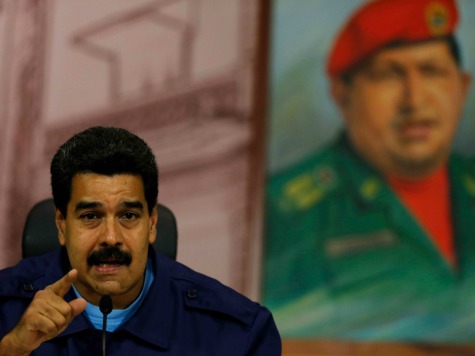
The economic situation in Venezuela has grown so dire under socialist President Nicolás Maduro that the federal government announced a plan to install a mandatory fingerprinting system in supermarkets, which would prevent individuals from buying “too much” of any one grocery item.
As BBC explains, Maduro’s government has announced the system as a way to “combat food shortages and smuggling,” claiming that individuals have created a black market of grocery items in Colombia that threatens the vitality of the Venezuelan economy. In a televised speech this week, Maduro himself explained, “[We should] establish, as it should be explained, a biometric system in all the distribution systems and commercial locales, public and private.” He did not elaborate as to how the fingerprinting system would work (remarks in Spanish below):
The system, the Spanish-language outlet Vanguardia explains, would prevent an individual from buying the same grocery item more than once per week in any government network, despite the fact that the government has yet to impose official quotas. It would allow, the government offered, for goods to be distributed “in a fair and orderly fashion.”
Such a move would be unprecedented for an OPEC nation, though not surprising in light of similar measures the Venezuelan government has announced to prevent individuals from freely purchasing other goods, such as vegetable oil, butter, milk, and flour. As the nation’s inflation rate reached 60% in April– due to a number of factors, including Maduro’s insistence of giving nations like Cuba free oil rather than selling it to prospective buyers– the socialist government installed a ration card system that would prevent the free sale of necessary groceries. The government also began rationing water at this time. The fingerprint system is expected to function as a more draconian version of the ration card.
The Venezuelan opposition, which has been protesting tirelessly since the arrest of Popular Will party opposition leader Leopoldo López in February, has condemned the plan as yet another attempted to “Cubanize” Venezuelan society, depriving citizens of the freedom to acquire basic needs in a nation so lavishly blessed with natural resources. The move also allowed the Venezuelan government to monitor via fingerprints exactly what each individual buys– what they eat and clean their homes with.
In addition to rationing needs and goods and closely controlling the distribution of items such as lumber for coffins and newspaper printer ink, the Venezuelan government recently installed a “breathing tax” in Caracas’ Maiquetía International Airport in order to continue paying for air conditioning.

COMMENTS
Please let us know if you're having issues with commenting.